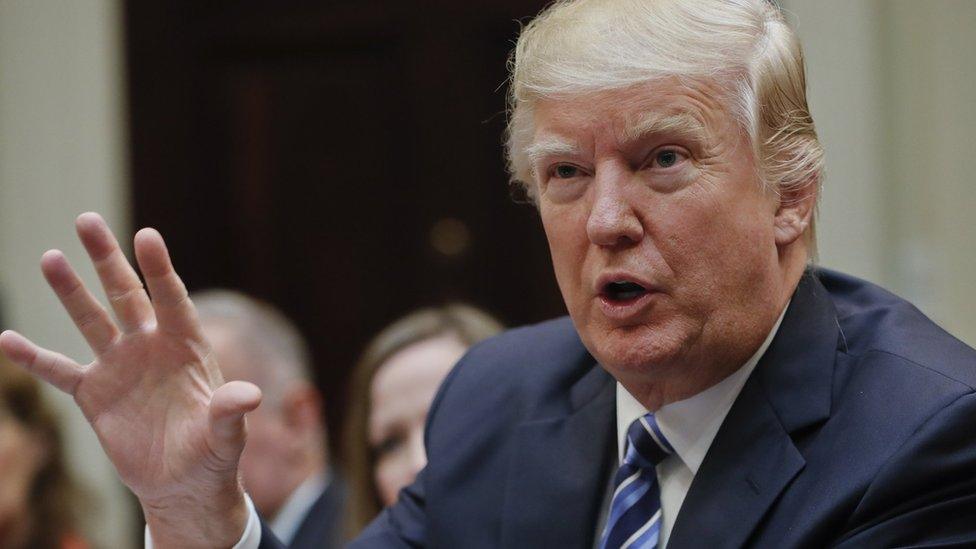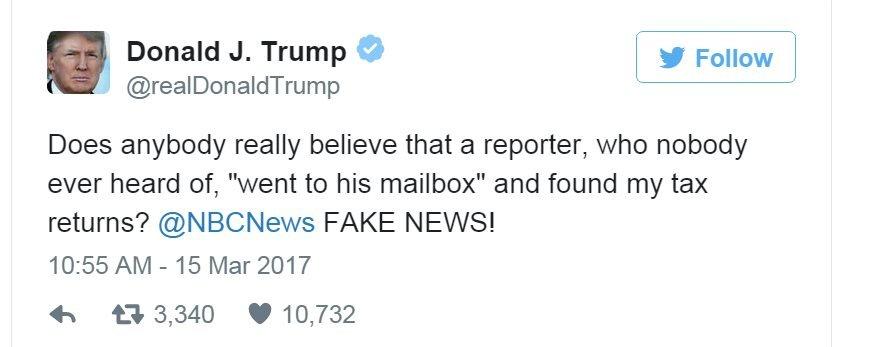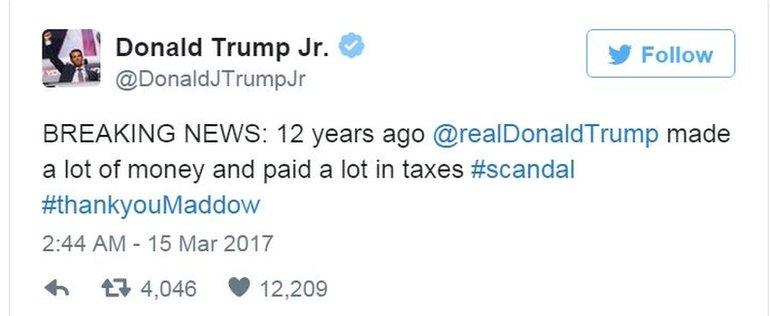Donald Trump's 2005 tax return leak reveals $38m bill
- Published

President Trump has refused to release his tax returns, saying they are under audit by tax authorities
US President Donald Trump paid $38m (£31m) in tax on more than $150m (£123m) income in 2005, a leaked partial tax return shows.
The two pages of tax return, revealed by US TV network MSNBC, also showed he wrote off $103m in losses. It gave no details on income sources.
The White House said publishing the tax return was against the law.
Mr Trump refused to release his tax returns during the election campaign, breaking with a long-held tradition.
How was it found?
On Tuesday evening, MSNBC announced that it had a copy of one of Mr Trump's tax returns, dating from 2005.
The details were revealed on a show later that night, anchored by journalist Rachel Maddow.
MSNBC said they received the document from financial journalist and Trump biographer David Cay Johnston, who received it in the post from an anonymous source.
Did Donald Trump leak his own tax return?
On the programme Mr Cay Johnston confirmed he had no further details on the source, but speculated that the leak could have come from Mr Trump himself.
Although leaking federal tax returns is a criminal offence, Ms Maddow argued that the network was exercising its right to freedom of speech under the First Amendment to the US Constitution to publish information in the public interest.
On Wednesday morning, President Trump slammed Mr Cay Johnston on Twitter, and cast doubt on the claim that the papers came unsolicited through the post.

The Pulitzer Prize-winning journalist said he and his family received threats over the report, calling it , externala "disturbing sign of how Trump damages civil debate".
"Trump fans call & harass my wife & one of my children after I break story White House confirmed. Sad! Let's have open debate, not threats," he tweeted, external.
What have we learnt?
The release showed Mr Trump paid the Internal Revenue Service $38m in 2005, an effective tax rate of 24%.
This is higher than the average American citizen would pay but below the 27.4% averaged by higher-earning taxpayers.
The bill comprises $5.3m in federal income tax and an extra $31m in what is called alternative minimum tax (AMT).
AMT was set up nearly 50 years ago to stop the wealthiest people from using deductions and loopholes to avoid paying taxes. Mr Trump has called for it to be abolished.
What don't we know?
President Trump's critics have wanted to know more about his income tax payments, but they also want more transparency on his business ties, particularly on any links to Russia. No substantial business links have been proven.

President Trump's business interests include golf courses and luxury hotels
The two-page form only gives basic figures and offers no insight into the sources of his earnings.
It also does not give details on any charity donations.
Last October, the New York Times revealed parts of Mr Trump's 1995 tax returns that showed losses of $916m (£753m). The newspaper said this could have affected his returns for up to 18 subsequent years, allowing him to legally avoid paying federal income taxes.
The forms disclosed on Tuesday do not say whether the £103m write-down that Mr Trump recorded in 2005 is connected to the losses in 1995.
Why has Trump not released his tax returns?
Every US presidential candidate since 1976 has released their tax returns although there is no legal requirement to do so.
Throughout his presidential campaign and since his election, Mr Trump has refused to release his returns.
He has said he is under audit by tax authorities and that his lawyers advise against releasing the documents.
Adviser to Trump tells Today the President's tax returns are a a distraction from his essential mission
The US Internal Revenue Service has a policy not to confirm whether or not individuals are under audit, but says it does not stop anyone from releasing their own returns.
Mr Trump's critics have created numerous petitions calling for their full release, including one that gathered over a million signatures.
During last year's election campaign, Democratic candidate Hillary Clinton accused Mr Trump in a head-to-head debate of paying no federal income tax.
He responded: "That makes me smart."

Analysis: Anthony Zurcher, BBC News, Washington
We now have another snippet, just the smallest glimpse, into Donald Trump's personal financial empire. The few pages from 2005 reveal that the alternative minimum tax, first instituted in 1970, did what it was supposed to do - prevent a very wealthy individual from paying a relatively tiny amount of federal taxes.
Beyond that, the contours of Mr Trump's personal wealth remain a mystery. Only supporting tax documentation, not included in this leak, could show the details of Mr Trump's income, including sources both domestic and international.
For a few moments, the political world thought a political bombshell was about to drop on the White House. In fact, it was more like lightning at night - a quick flash, then a return to darkness.

Could the Trump administration be behind the leaks?
In the past, Mr Trump is alleged to have called the US media and used a pseudonym to give them favourable stories about his business dealings.
Mr Trump's son, Donald Trump Jr, said on Twitter that he was thankful for the release as they showed his father was paying taxes.

However, in a statement issued before the broadcast, the White House was less enthusiastic, saying: "You know you are desperate for ratings when you are willing to violate the law to push a story about two pages of tax returns from over a decade ago."
It has also said Mr Trump had a responsibility to pay no more tax than was legally required.
What happens next?
Correspondents say that, despite the lack of detail, the leak is significant because so little is known about President Trump's tax affairs and the new information could increase pressure on him to release more.